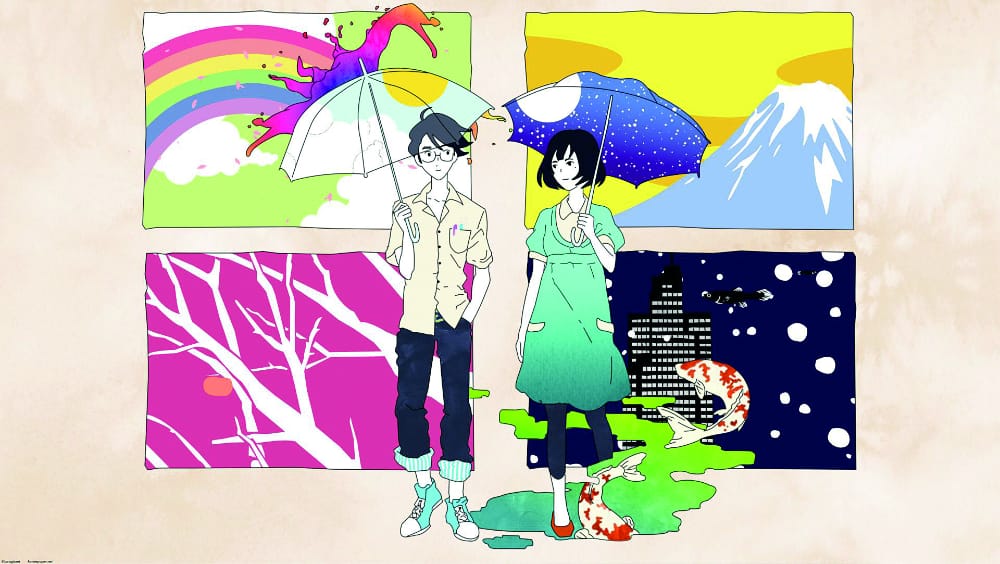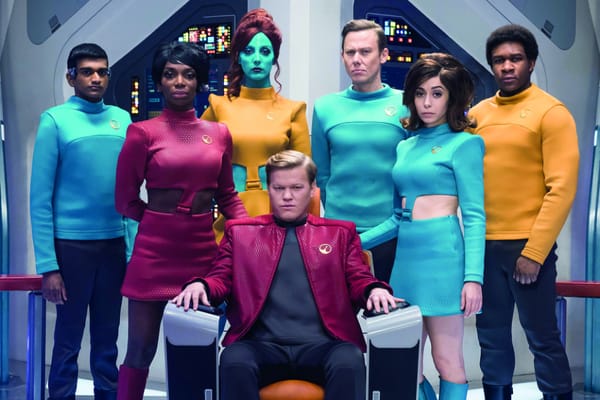From high-school comedies to dark police dystopias – an anime for all seasons
Anime is much more than it might appear at first. TV writers and anime enthusiasts Mingrou Xie and Pavan Inguva take you through their top picks for all tastes.

Japanese manga and anime has something for everyone: enchanting soundtracks, remarkable aesthetics and animation, nuanced and thought-provoking storylines, and more. As a media form, it has always been bold and refreshing, pushing the boundary on plots, character development, and artistic styles to great effect. The industry’s ability to be dynamic and vibrant is evident in the sheer variety and quality of series ranging from the highly popular and lengthy trinity: Naruto, Bleach, and One Piece, to the more warm-hearted and cutesy short series about high school romance Tsurezure Children. The following anime series are a sample of what we feel offer insightful perspectives to life and society – enthralling works that are worth a watch.
MY TEEN ROMANTIC COMEDY SNAFU
Director: Kei Oikawa. 13 episodes
I started this anime series half expecting a typical sappy high school rom-com (which I enjoy as a guilty pleasure). But instead it was a witty and incisive social commentary analysing the nature of human relationships and conceptions of the self. This is one of the few shows where I would have to take a break in the middle of an episode because the dialogue would get too real. We are greeted by the main character Hachiman Hikigaya, a curmudgeon loner with a ‘twisted’ world view, who immediately sees the worst in people and any situation he is placed in. To help rehabilitate him, his teacher forces him to join the school’s volunteering club whose sole member prior to this was Yukino Yukinoshita, an attractive and multitalented loner who alienated herself after seeing people’s jealousy of her beauty and talents. This club is a bit unique in that it gets requests from the other students, and the club helps the requester to reach their goals. Examples of such requests include guidance on baking, organising events, and even asking a girl out. Each episode showcases the club’s activities and the interaction between our two loners and a host of other characters, each with different attributes, such as Hikigaya’s sister or Yui Yuigahama, who after being the first character to request the club’s service decides to join as a member.
The character evolution is well done, and it is quite endearing to see both Hikigaya and Yukino develop a sense of humanity. Hikigaya’s initial methodology for helping – whilst seemingly expedient – usually incurs a high personal cost which he is willing to bear and/or often involves working with darker aspects of people’s psyche. However, he gradually sees that it doesn’t work out or that he unknowingly hurts his friends by his self-immolation, causing him to change Even ancillary characters have deeper sides shown throughout the show, collectively helping the viewer become emotionally invested in the show. PI
MOBILE SUIT GUNDAM 00
Director: Seiji Mizushima. 50 episodes
The Gundam franchise spans a few decades and still produces excellent shows. Gundam 00 is the 11th series, and ran from 2007-2009, with a total of 50 episodes spread over two seasons. Set in a post-fossil fuel world, three power blocs form, each with a space elevator equipped to harness solar power in space. Countries previously dependent on fossil fuels see their fortunes change, further destabilising a world rife with sectarian or drug violence. Considering the possibility of bringing violence into space at a stage where mankind is beginning to explore the cosmos, Celestial Being, a non-state actor with four disproportionately powerful gundams, seek to stop all wars. As is with all gundam shows, if you can find a HD version of this, you are in for a visual treat, with outstanding animation and high-voltage battles involving interstellar fleets and overpowered mechas.
“The Gundam franchise spans a few decades and still produces excellent shows”
The show remarkably weaves together threads from a multitude of dimensions: pernicious effects of war, human evolution, contact with extra-terrestrials, energy politics, the rule of law, and the abuse of power. The way characters (conventional militaries, Celestial Being, and other non-state actors and civilians) are developed in terms of their backstories and how they progress during the series serve to point out the different motivations for engaging in various courses of actions during conflict. The sheer diversity of people who have experienced different aspects of conflict serve to make the complex affair of conflict more relatable. Take Setsuna, the main gundam pilot, who was a child solider brainwashed into killing his parents or Andrei Smirnov, a soldier who resents his father for having killed his mother due to a tactical decision (both his parents were in the military). On a larger scale, I enjoyed how the show discusses big ideas, such as the appropriate outlook humanity needs to grow as a species or how power is used/abused by different people and how can we address it. With such smooth storytelling across the scales, it makes for a profound and enjoyable show to watch. PI
MUSHI-SHI
Director: Hiroshi Nagahama. 46 episodes
Mushi-Shi is one of the best examples of storytelling through an anime or cartoon series. The storyline, artwork, choice of music, and the character development are well done, and work together harmoniously to delight the viewer. The series consists of 46 episodes spread over two seasons – season one released in 2005 and season two in 2014.
Mushi are a kind of primordial and ethereal life form. They interact with the world as much as any animal or plant would. However, the show takes on a supernatural and surreal angle as the Mushi are only visible to a handful of people, many of whom are not even familiar with them, or their interaction with the normal world is unusual and mythical. There are a group of people called Mushi-Shis who are trained in the ways of the Mushi and how to counteract the effect of potentially harmful Mushis. The show follows Mushi-Shi Ginko, who is unable to remember anything before the age of ten and tends to attract Mushi to his location. As such, he is a wanderer, and most of the time he serves to drive the plot forward as the show focuses on the interaction of people with the Mushi.
“Mushi-Shi often brings in heavy ideas, giving the viewer food for thought on many issues”
Each episode is self-contained and typically starts with someone or a group of people interacting with the Mushi in an unideal manner, often to their detriment. Ginko then comes along and helps the people work through the seemingly mysterious ways of the Mushi and generally helps to establish a suitable equilibrium. I quite enjoy how the show does not shy away from tragic endings where appropriate and it makes the overall situation a tad more realistic, as neither joy nor tragedy are forced. In the abstraction of the surreal, Mushi-Shi often brings in heavy ideas, giving the viewer food for thought on issues such as the nature of the choices we make or how we interact with that which is outside of us. MX

TATAMI GALAXY
Director: Masaaki Yuasa. 11 episodes
Ever dreamt of a rose-coloured campus life - exciting club activities, a lovely girl/boyfriend, and more? Ever wanted to redo your university choices, erase those regrettable Facebook pictures, and start everything all over again?
Well, Tatami Galaxy (Yojouhan Shinwa Taikei) is almost like a satirical commentary of that dream of yours. It’s about a bitter university student (his name remains unknown throughout) who is continually thrown back in time to repeat his campus life, as each time he regrets how he has lived it. A set of over-the-top and extremely lovable characters surround him in his ‘quest’, including his devilish and only friend Ozu who seems to thwart his every effort, and eighth year student Higuchi with his mysterious acts.
The anime is immensely quirky, bearing unique colour schemes reminiscent of textile prints, and humorous dialogue - more often than not a blunt and matter-of-fact monologue by the protagonist. Frequent anime watchers will find it a breath of fresh air, whereas newcomers get to enjoy the more artsy side of anime. The opening song is also absolutely adorable in my opinion.
There is one downside, in that some viewers might consider the constant repetition of the same scenario boring, but I personally felt that each story was unique and enthralling. All in all, the anime keeps your imagination active thinking about what the protagonist (or maybe you, yourself?) could have done to better colour his campus life.
Fellow students, grab the opportunity dangling in front of your eyes. This anime will definitely brighten up your monochromatic campus life!
P.S. If you can’t get enough of the animation, watch Yoru ha Mijikashi Arukeyo Otome. It is helmed by the same staff that did Tatami Galaxy, and features several well-placed references to the anime. MX
PSYCHO PASS
Director: Naoyoshi Shiotani; Katsuyuki Motohiro. 33 episodes
With screenplay by the famous Gen Urobuchi (screenwriter of Puella Magi Madoka Magica) and character designs by Akira Amano (mangaka of Katekyo Hitman Reborn!), Psycho Pass is a thought-provoking psychological thriller through and through.
Set in the near dystopian future, everyone is assigned jobs and statuses based on their Crime Coefficient, or tendency to commit a crime. The start of the story sees a new officer, Akane Tsunemori, joining the Public Safety Bureau, which oversees ‘neutralisation’ of people with high Crime Coefficients. Slowly, through different encounters and several freaky incidents, she discovers the darker side of what she once thought was a perfect societal infrastructure.
Perhaps some of you might be reminded of the drama series Person of Interest. Psycho Pass is that and more—it raises questions about morality, society, and humanity. If your Crime Coefficient remains low, does it mean what you’re doing is not wrong? Should you always protect the law? Is it right to judge a human’s worth by their tendency to commit crime? Should relationships be influenced by Crime Coefficients?
Unfortunately, Psycho Pass drags out the storyline in some places, and the illustration can be shaky towards the end. However, the storyline is gripping, and will take you on a whirlwind ride through what it means to be human and to be ‘right’. MX
FULLMETAL ALCHEMIST BROTHERHOOD
Director: Yasuhiro Irie. 64 episodes
An eight year old classic, FMA still deserves a shout out. If alchemy, conspiracy, and camaraderie sound like your cup of tea, this is the anime for you. In a country where the principle of Equivalent Exchange underlies alchemy, two brothers’ journey to find a solution to regain their body and limbs lost to human transmutation, a forbidden alchemy. Along their adventures, they uncover the secrets behind the country and reach a horrific conclusion about the alchemy they have been taking for granted.
I found the anime truly riveting. One of the questions the anime raises - what of equal value to your desired result would you sacrifice? - is pertinently raised in different characters’ goals in the story, and you can see how their behaviours change as different scenarios present themselves. That is just one of the messages conveyed through a blend of well thought out characters and intricate storylines.
“An eight year old classic, Fullmetal Alchemist still deserves a shout out”
Other highlights of the anime include an amazing soundtrack (openings and endings especially), and that it stays true to the original manga’s art style and storyline. For those who like the typical shounen style of action and friendship, FMA has plenty of it, yet manages to maintain a good balance between action sequences and thought-provoking moments.
Although the anime tells instead of shows at several points, and has one too many flashbacks for my liking (probably because it is a long series), it is otherwise a very good anime. Definitely give it a watch!
(If you prefer to skip the flashbacks, you can try the manga instead, which is more succinct. The mangaka, Hiromu Arakawa, also has two other good series under her belt: Silver Spoon and The Heroic Legend of Arslan.) MX








